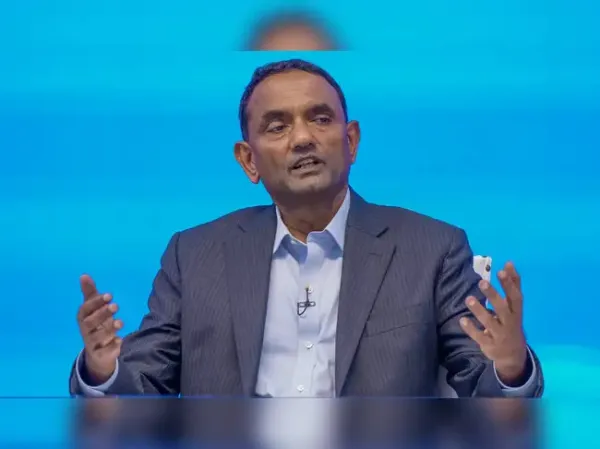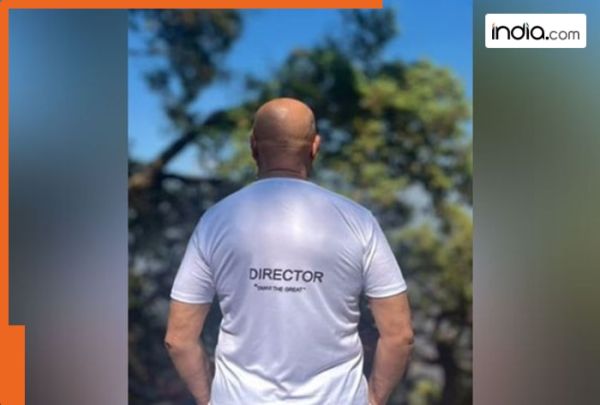Tata Consultancy Services (TCS) chief executive K Krithivasan cites global macroeconomic uncertainty that has made clients cautious on spending for the IT industry bellwether last week posting a fall in dollar revenue for the third consecutive quarter. Speaking to ET’s Beena Parmar, Himanshi Lohchab and Surabhi Agarwal, Krithivasan dismisses concerns about the company's growth being hinged on its network deal with BSNL, saying TCS is not a "one-trick pony", and stresses that the $30 billion firm is not losing market share to anyone. Edited excerpts:
What caused the revenue to shrink for three consecutive quarters, something unheard of in the case of TCS?
Our international revenue was still positive last quarter. I'm not being defensive about this but the situation has been uncertain in the market. Some of the indicators you see — consumer confidence and uncertainty index — all of them are not trending in the right direction. The airline and the retail industry are struggling. And the auto industry is not doing well, because of the confusion over EVs (electric vehicles). The way it was supposed to pick up, it hasn’t. There were multiple of these factors, and some of them come from trade discussions. Because of the uncertainty, customers are trying to hit the water dry… Currently the focus is on programmes that would reduce costs; essentially cost optimisation programmes.
I am not glossing over the fact that international (revenue) has not grown fast enough. I am just correcting things that international last quarter (January-March) had minor growth, this quarter (April-June) had a minor degrowth. Essentially, it’s been that international (revenue) has been very static. And domestic (revenue) has been subject to whatever happened in BSNL.
Is it fair to say that TCS has depended too much on the BSNL deal over the last two years; it's like being a one-trick pony?
It's a very unfair criticism to call TCS the one-trick pony, because our annual revenue is now above $30 billion. And BSNL is probably about $1 billion or something. So, calling $1 billion out of $30 billion and saying TCS is a one-trick pony is a disservice. If TCS is getting impacted, other players are also getting impacted. It's not that somebody is growing at 10% and we are growing at 1%. At the same time, we are not losing market share to anybody. We are doing quite well and we are participating in almost all the opportunities in the market.
You said you expect the international business this year to be better than last year. So, what gives you hope? How do you continue to keep the company growing amid this uncertainty?
One of the big moves that we did recently is to align some of our service lines around our big bets. And then we spruced up our management team around that with our COO (chief operating officer) coming in, focusing specifically on service lines. And then wanting to infuse AI in every one of those service lines and trying to go with the integrated solutions to our clients. So, we are taking a number of steps and working with our key customers to increase the adoption of AI and other technologies.
Also Read: Can TCS overcome short-term challenges to achieve its FY-26 growth targets?
TCS has a new COO in Aarthi Subramanian, and she is looking at new service lines. How will there be a split of responsibilities, and will there be more senior level changes?
As for Aarthi, currently she is focused on service lines and trying to see how do you stitch these multi service line opportunities, and how do you deliver benefit to the customers, leveraging new technologies. And also developing the whole capability and talent within the organisation. So, her approach currently will be from a service line perspective. But otherwise, organisational change is a continuous process. We also got Mangesh (Sathe as chief strategy officer), where we thought we need to have someone who will focus on running a Strategy Office.
Are you seeing new competition coming from smaller firms bringing in newer models? How do you see the IT services model to evolve in the next two years with AI?
One, definitely newer competition will come. And many of them believe that they can provide the same service at a different price point or different productivity forms. At the same time, companies like TCS have an inherent advantage because the technology by itself doesn't give you the results. We need the contextual understanding of what works for a given customer because you've been seeing this AI wave for almost the last two and a half years. But still we are asking questions on where is our return on investment? It hasn't really scaled. That's because organisations have a legacy and there are certain ways they work. So, it takes time.
And companies like TCS have a much better understanding on how to work with enterprises to deliver the results. It's just not the technology solution alone. So that's where we come in. But at the same time, every now and then, new competition keeps coming up, somebody may have a great solution, somebody may have a great methodology. And again, some of them you compete with, some of them you work along because there could be a complementarity where you can work with.
Do you think the overall model is going to get disrupted very quickly?
I don't know very quickly. But there could be a disruption. I'd rather call it a transition or a transformation or evolution, like companies say 20% or 50% code is machine generated. So that number will keep increasing. But at the same time, immediately all the programmers will not go away because somebody has to validate the code generated by these machines because they are not 100% accurate every time. So, there are so many other opportunities that will keep coming up. Yes, the traditional SDLC (software development life cycle) that we are used to seeing in terms of somebody doing a design, somebody doing coding, somebody doing testing, it will evolve; it will change and new roles may come into play.
What are your thoughts on the BPO consolidation? What do you think are the possibilities there with AI?
We announced a number of agents that we have developed that we have also deployed. In fact, I called out two years ago that BPO is one of the industries that would get disrupted even before the traditional coding. Because there are a lot of opportunities of creating AI agents or agentic AI. Both of them have a very strong role today. You would see that business evolving faster (than others).
Also Read: Inside Capgemini’s $3 billion deal for WNS: All you need to know
What caused the revenue to shrink for three consecutive quarters, something unheard of in the case of TCS?
Our international revenue was still positive last quarter. I'm not being defensive about this but the situation has been uncertain in the market. Some of the indicators you see — consumer confidence and uncertainty index — all of them are not trending in the right direction. The airline and the retail industry are struggling. And the auto industry is not doing well, because of the confusion over EVs (electric vehicles). The way it was supposed to pick up, it hasn’t. There were multiple of these factors, and some of them come from trade discussions. Because of the uncertainty, customers are trying to hit the water dry… Currently the focus is on programmes that would reduce costs; essentially cost optimisation programmes.
I am not glossing over the fact that international (revenue) has not grown fast enough. I am just correcting things that international last quarter (January-March) had minor growth, this quarter (April-June) had a minor degrowth. Essentially, it’s been that international (revenue) has been very static. And domestic (revenue) has been subject to whatever happened in BSNL.
Is it fair to say that TCS has depended too much on the BSNL deal over the last two years; it's like being a one-trick pony?
It's a very unfair criticism to call TCS the one-trick pony, because our annual revenue is now above $30 billion. And BSNL is probably about $1 billion or something. So, calling $1 billion out of $30 billion and saying TCS is a one-trick pony is a disservice. If TCS is getting impacted, other players are also getting impacted. It's not that somebody is growing at 10% and we are growing at 1%. At the same time, we are not losing market share to anybody. We are doing quite well and we are participating in almost all the opportunities in the market.
You said you expect the international business this year to be better than last year. So, what gives you hope? How do you continue to keep the company growing amid this uncertainty?
One of the big moves that we did recently is to align some of our service lines around our big bets. And then we spruced up our management team around that with our COO (chief operating officer) coming in, focusing specifically on service lines. And then wanting to infuse AI in every one of those service lines and trying to go with the integrated solutions to our clients. So, we are taking a number of steps and working with our key customers to increase the adoption of AI and other technologies.
Also Read: Can TCS overcome short-term challenges to achieve its FY-26 growth targets?
TCS has a new COO in Aarthi Subramanian, and she is looking at new service lines. How will there be a split of responsibilities, and will there be more senior level changes?
As for Aarthi, currently she is focused on service lines and trying to see how do you stitch these multi service line opportunities, and how do you deliver benefit to the customers, leveraging new technologies. And also developing the whole capability and talent within the organisation. So, her approach currently will be from a service line perspective. But otherwise, organisational change is a continuous process. We also got Mangesh (Sathe as chief strategy officer), where we thought we need to have someone who will focus on running a Strategy Office.
Are you seeing new competition coming from smaller firms bringing in newer models? How do you see the IT services model to evolve in the next two years with AI?
One, definitely newer competition will come. And many of them believe that they can provide the same service at a different price point or different productivity forms. At the same time, companies like TCS have an inherent advantage because the technology by itself doesn't give you the results. We need the contextual understanding of what works for a given customer because you've been seeing this AI wave for almost the last two and a half years. But still we are asking questions on where is our return on investment? It hasn't really scaled. That's because organisations have a legacy and there are certain ways they work. So, it takes time.
And companies like TCS have a much better understanding on how to work with enterprises to deliver the results. It's just not the technology solution alone. So that's where we come in. But at the same time, every now and then, new competition keeps coming up, somebody may have a great solution, somebody may have a great methodology. And again, some of them you compete with, some of them you work along because there could be a complementarity where you can work with.
Do you think the overall model is going to get disrupted very quickly?
I don't know very quickly. But there could be a disruption. I'd rather call it a transition or a transformation or evolution, like companies say 20% or 50% code is machine generated. So that number will keep increasing. But at the same time, immediately all the programmers will not go away because somebody has to validate the code generated by these machines because they are not 100% accurate every time. So, there are so many other opportunities that will keep coming up. Yes, the traditional SDLC (software development life cycle) that we are used to seeing in terms of somebody doing a design, somebody doing coding, somebody doing testing, it will evolve; it will change and new roles may come into play.
What are your thoughts on the BPO consolidation? What do you think are the possibilities there with AI?
We announced a number of agents that we have developed that we have also deployed. In fact, I called out two years ago that BPO is one of the industries that would get disrupted even before the traditional coding. Because there are a lot of opportunities of creating AI agents or agentic AI. Both of them have a very strong role today. You would see that business evolving faster (than others).
Also Read: Inside Capgemini’s $3 billion deal for WNS: All you need to know








